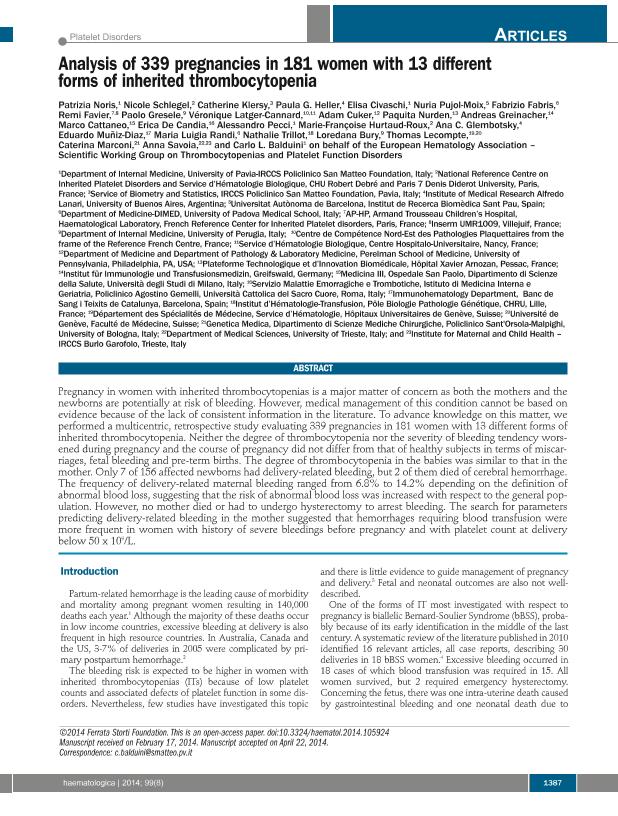Artículo
Analysis of 339 pregnancies in 181 women with 13 different forms of inherited thrombocytopenia
Noris, Patrizia; Schlegel, Nicole; Klersy, Catherine; Heller, Paula Graciela ; Civaschi, Elisa; Pujol Moix, Nuria; Fabris, Fabrizio; Favier, Remi; Gresele, Paolo; Latger Cannard, Véronique; Cuker, Adam; Nurden, Paquita; Greinacher, Andreas; Cattaneo, Marco; De Candia, Erica; Pecci, Alessandro; Hurtaud Roux, Marie Françoise; Glembotsky, Ana Claudia
; Civaschi, Elisa; Pujol Moix, Nuria; Fabris, Fabrizio; Favier, Remi; Gresele, Paolo; Latger Cannard, Véronique; Cuker, Adam; Nurden, Paquita; Greinacher, Andreas; Cattaneo, Marco; De Candia, Erica; Pecci, Alessandro; Hurtaud Roux, Marie Françoise; Glembotsky, Ana Claudia ; Muñiz Diaz, Eduardo; Randi, Maria Luigia; Trillot, Nathalie; Bury, Loredana; Lecompte, Thomas; Marconi, Caterina; Savoia, Anna; Balduini, Carlo L.; European Hematology Association Scientific Working Group on Thrombocytopenias and Platelet Function Disorders
; Muñiz Diaz, Eduardo; Randi, Maria Luigia; Trillot, Nathalie; Bury, Loredana; Lecompte, Thomas; Marconi, Caterina; Savoia, Anna; Balduini, Carlo L.; European Hematology Association Scientific Working Group on Thrombocytopenias and Platelet Function Disorders
 ; Civaschi, Elisa; Pujol Moix, Nuria; Fabris, Fabrizio; Favier, Remi; Gresele, Paolo; Latger Cannard, Véronique; Cuker, Adam; Nurden, Paquita; Greinacher, Andreas; Cattaneo, Marco; De Candia, Erica; Pecci, Alessandro; Hurtaud Roux, Marie Françoise; Glembotsky, Ana Claudia
; Civaschi, Elisa; Pujol Moix, Nuria; Fabris, Fabrizio; Favier, Remi; Gresele, Paolo; Latger Cannard, Véronique; Cuker, Adam; Nurden, Paquita; Greinacher, Andreas; Cattaneo, Marco; De Candia, Erica; Pecci, Alessandro; Hurtaud Roux, Marie Françoise; Glembotsky, Ana Claudia ; Muñiz Diaz, Eduardo; Randi, Maria Luigia; Trillot, Nathalie; Bury, Loredana; Lecompte, Thomas; Marconi, Caterina; Savoia, Anna; Balduini, Carlo L.; European Hematology Association Scientific Working Group on Thrombocytopenias and Platelet Function Disorders
; Muñiz Diaz, Eduardo; Randi, Maria Luigia; Trillot, Nathalie; Bury, Loredana; Lecompte, Thomas; Marconi, Caterina; Savoia, Anna; Balduini, Carlo L.; European Hematology Association Scientific Working Group on Thrombocytopenias and Platelet Function Disorders
Fecha de publicación:
08/2014
Editorial:
Ferrata Storti Foundation
Revista:
Haematologica
ISSN:
0390-6078
e-ISSN:
1592-8721
Idioma:
Inglés
Tipo de recurso:
Artículo publicado
Clasificación temática:
Resumen
Pregnancy in women with inherited thrombocytopenias is a major matter of concern as both the mothers and the newborns are potentially at risk of bleeding. However, medical management of this condition cannot be based on evidence because of the lack of consistent information in the literature. To advance knowledge on this matter, we performed a multicentric, retrospective study evaluating 339 pregnancies in 181 women with 13 different forms of inherited thrombocytopenia. Neither the degree of thrombocytopenia nor the severity of bleeding tendency worsened during pregnancy and the course of pregnancy did not differ from that of healthy subjects in terms of miscarriages, fetal bleeding and pre-term births. The degree of thrombocytopenia in the babies was similar to that in the mother. Only 7 of 156 affected newborns had delivery-related bleeding, but 2 of them died of cerebral hemorrhage. The frequency of delivery-related maternal bleeding ranged from 6.8% to 14.2% depending on the definition of abnormal blood loss, suggesting that the risk of abnormal blood loss was increased with respect to the general population. However, no mother died or had to undergo hysterectomy to arrest bleeding. The search for parameters predicting delivery-related bleeding in the mother suggested that hemorrhages requiring blood transfusion were more frequent in women with history of severe bleedings before pregnancy and with platelet count at delivery below 50 × 10(9)/L.
Palabras clave:
Plaquetas
,
Trombocitopenia
,
Hereditaria
,
Diámetro Plaquetario
Archivos asociados
Licencia
Identificadores
Colecciones
Articulos(IDIM)
Articulos de INST.DE INVEST.MEDICAS
Articulos de INST.DE INVEST.MEDICAS
Citación
European Hematology Association Scientific Working Group on Thrombocytopenias and Platelet Function Disorders; Balduini, Carlo L.; Savoia, Anna; Marconi, Caterina; Lecompte, Thomas; Randi, Maria Luigia; et al.; Analysis of 339 pregnancies in 181 women with 13 different forms of inherited thrombocytopenia; Ferrata Storti Foundation; Haematologica; 99; 8; 8-2014; 1387-1394
Compartir
Altmétricas



